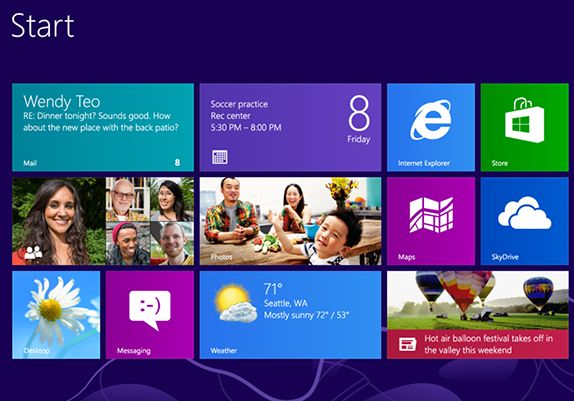Channel doubts linger as Windows 8 released

Big concerns about consumer sales, even bigger concerns about businesses
After a lengthy build up, Windows 8 is to see its official launch today, with Microsoft heralding the operating system as its most important release since Windows 95.
In fact, CEO Steve Ballmer claimed that the changes made as part of the new operating system usher in a “new era of computing”. But whether Microsoft is itself helping to drive the shift in the IT landscape or merely attempting to react to fundamental changes in the industry will become more clear as the operating system goes on sale.
It is an anxious time for Microsoft. Windows 8 has received mixed reviews, with some fairly radical changes in terms of appearance with the addition of the Metro interface and the disappearance of the ‘start’ button, and there are big question marks over when and if business users will warm to the changes.
A wide range of devices that OEMs have produced will go on sale at midnight on Friday in the UK, and many of these vendors are also placing big bets on Windows 8 succeeding in the consumers. However initial reaction amongst the channel and from retail players has varied, and there are some doubts over whether Microsoft’s big bets will pay off.
While there appears to be confidence that consumer sales will be more positively impacted, with Microsoft clearly placing an emphasis on the consumerisation of IT, this is hardly a given considering both the tough economic landscape and the rise in popularity of both iOS and Android. Big question marks remain over corporate use too, and many are expecting that Windows 8 could go the way of Vista, quietly brushed away and skipped over by businesses.
According to one IT reseller, Microsoft has taken a big risk with its new design.
“It is a very bold move,” ChannelBiz UK was told. “Windows 8 could take a bit of getting used to.
“There will be some initial issues with a totally new package, especially when the front face looks so different, but something that is new will always get that kind of reception. There is a small element of risk.”
However the reseller says that selling to business customers could be made difficult by the redesign: “They don’t want something if it is not really needed. For them [the metro interface] might be a bit of a pain. If they have got a whole team of staff and having to train them, and there is no productive results immediately then they will say as a business it is a pain.”
Richard Marsden at distributor VIP Computers is more confident that the release of Windows 8 could see more enthusiasm for parts of the PC market.
“The Windows 8 launch will certainly impact the market by stimulating spending in the channel, but also creating huge opportunities for multiple devices.”
He believes that Windows 8 can help drive sales of newer form factors, and could finally get Ultrabook sales moving a bit quicker for example.
“Ultrabooks have had a slow start, but it’s still early in the Ultrabook game,” Marsden said. “There are massive synergies between Windows 8 and Ultrabooks, as users seek to create and manage content on touch-powered Ultrabooks and other form factors.”
Quite how the release of Windows 8 impact will affect retail is unclear. A wide range of clamshell, hybrid and detachable PCs maybe coming out of manufacturers factories, but whether these really capture consumers imagination, and whether Windows 8 can also see success on tablets and smartphones is another question.
“Retailers will see a boost in laptop sales to start with, some people may have laid off buying a WIndows 7 machine,” said retail analyst Patrick O’Brien at Verdict, part of Datamonitor.
“A lot of shops have made much of the fact that they will give a free update to Windows 8 to try and stop that delaying of purchases, but there is no doubt that people will have done.”
However he says that the outlook for the tablet market is decidedly less optimistic.
“Whether or not it will involve the expansion of the market generally in terms of tablets and smartphone I wouldn’t have thought the impact would be very great,” he said.
” In terms of the retail channel it may encourage people to buy a few more tablets, but really it is fighting it out for market share with the other players.
“I don’t think there are many consumers who are holding off tablet or smartphone purchases until there was a decent Microsoft offering available.”
In terms of corporate sales, Microsoft faces an even bigger struggle. Canalys analyst Alastair Edwards said that it is difficult to for businesses to see any real benefit from upgrading to Windows 8.
“The big question is to what extent businesses in the short term will be attracted to Windows 8,” Edwards said. “If the perceived differentiator is touch then it is going to be hard for some customers to really justify that.”
“In the business environment the advantages of touch based devices are not so so huge for many users within an organisation.”
He also point out that most of the channel are not expecting WIndows 8 to play a big part in their portfolio of sales of the first six months of next year.
“The initial is expected by the channel to be slow,” he said. In the short term it is not going to change the world.”
“In the longer term it is probably going to have a bigger impact, but a lot of companies are reluctant to make that large scale shift in the medium to long term.”